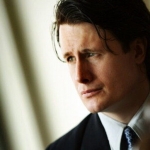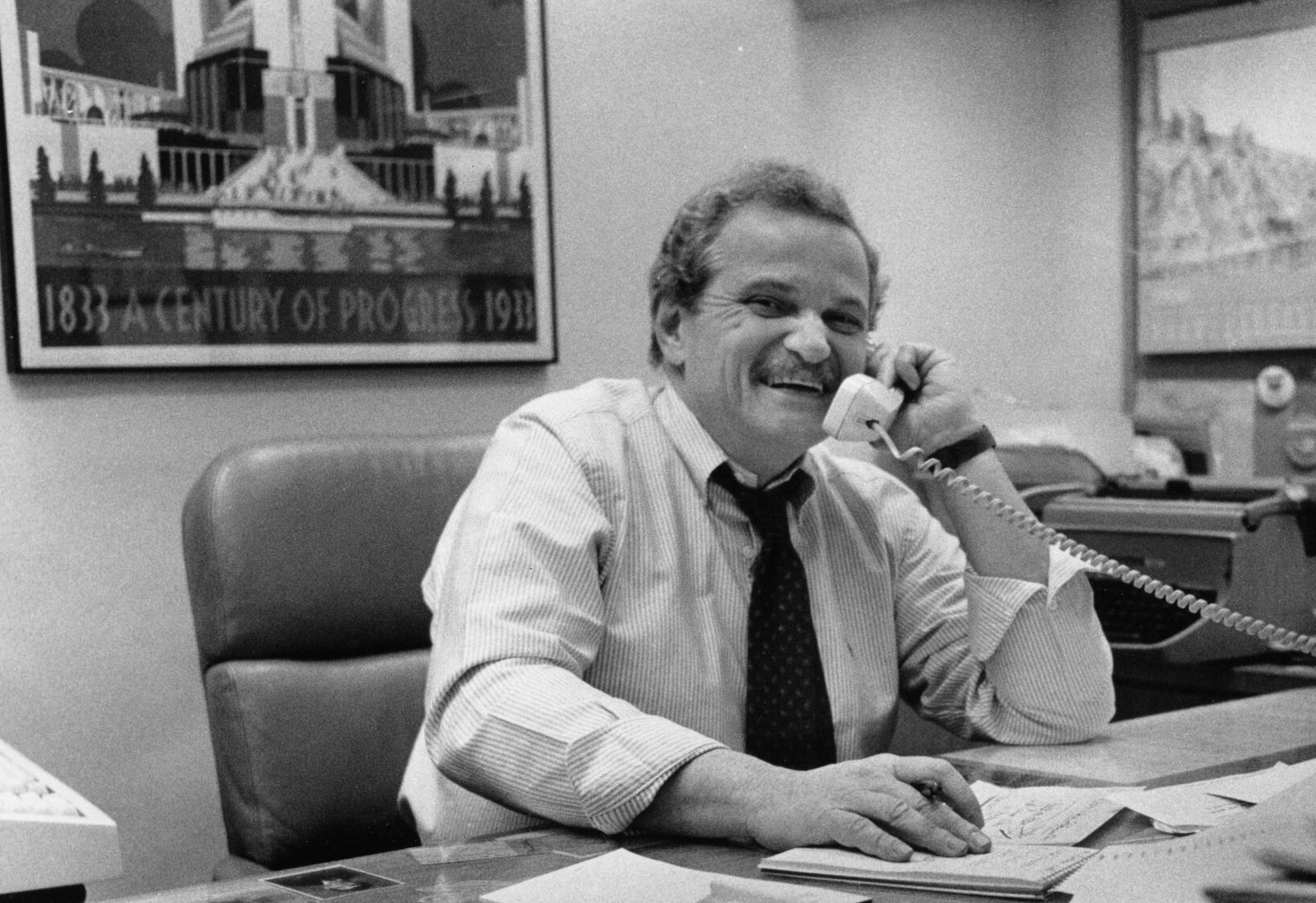Nick Horrock, 1936-2021: ‘Death be not proud’
Editor’s Note: This tribute is republished with permission from Bill Myers’s. Please read his blog. Many of us here worked with Pulitzer-Prize winner Nick Horrock throughout our careers and Nick even wrote for the Baltimore Post-Examiner.
He won his Pulitizer by going undercover in the Chicago prisons to investigate prison gangs and just a few years ago he was elected into the Maryland Journalism Hall of Fame, which is where the above Tribune photo was displayed. Nick gave the photo to Bill Myers as a gift. You can also still buy his dime detective novels on Amazon.
Nick Horrock is dead. Those words are painful to write. They’re also bewildering to write. If anyone could have told Death to talk a long walk off a short pier, it would’ve been Nick Horrock.
There’s that old line from Inherit the Wind. The Mencken character says “it’s the duty of a newspaper to comfort the afflicted and afflict the comfortable.” Nick must’ve had those words etched into his heart.
What a mighty heart it was. He wielded it like grapeshot. One of our fantastically mediocre mayors once took himself on a junket to China, paid for by the poor zhlubs of the District. The reporter who’d written the story up had been too polite for Nick’s tastes. He wanted a rewrite with some tougher questions asked. “Wait a second,” Horrock said. “There’s a guy I see on my way to this office, every day, and he’s picking his food out of the dumpster. How’s this trip going to help him?”
Wait a second. Whenever Horrock uttered those words, doom followed. He was compact, stocky. He looked as though he had been forged, not born. He had a square face, mounted on a square jaw, soldered to a square neck and ratcheted to square shoulders. On that square face, someone had welded furious lightning bolts on his brow and then again on his lips. That face was the helmet of a Viking chieftain, all angry Thor runes and dreadful scars one dared not dwell upon.
At his most restful, he didn’t breathe so much as he puffed, or hissed. Years of cigarettes and what he called “the good stuff” had scratched up an already gravelly baritone. He growled even in his light moments. If you can find a wood stove to heckle you about nut grafs—“Myers, have you been drinking? Well, have you thought about it? Might improve your copy…”—you’ll have something like the Horrock experience.
The FOIA incident
Let that sandpaper-and-cello voice climb its scales, though. Let it reach that klaxon range—you could hear it for miles (sometimes it still wakes me in the night)—and let him say, Wait a second. It meant your ass.
A District agency was once jerking me around about FOIA requests (like they do). Nick called a meeting. Our lawyer was there. Their lawyer was there. I was there. Nick was late. Their lawyer and our lawyer fell on each other like they were performing in a Rat Pack tribute. All sorts of sweet talk about maybe months, but perhaps even six-to-eight weeks if there was a miracle, on our FOIA requests. I sat in mounting fury but the sweet Midwestern boy in me forbade me from making a fuss.
Nick came in. The collar was already open, the tie already loosened, and his sleeves already rolled up. Before his butt hit the seat, he folded his arms. He looked as though he had wrapped himself in a straight jacket when he sat like that. He puffed, hissed and growled as our lawyer blew their lawyer’s smoke up his ass. She got a few words out, anyway.
“That’s all fine, but wait a second,” Nick said, waiving her words away as though they were odors coming from the fridge. The arms uncoiled, and he unsheathed his index finger. He aimed it at their lawyer’s throat, all the way across the table. “I’m trying to think of a reason not to sue you. So far, I haven’t heard anything tells me I shouldn’t.”
By the time he was done, the paint was peeling from the walls. We got our FOIAs, all right. The school official we were investigating for corruption ended up getting more than three years. She blamed us for it. That sweet Midwestern boy hasn’t bothered me much since.
Other Incidents
Nick didn’t spare himself his ferocity. He probably got it worse than anyone.
There was a lightness to it sometimes. Yes, he called the Lads in his newsroom “Sweetie.” Yes, it was because he knew God damn well that he’d eventually slip up and call one of the Lasses in his newsroom “Sweetie” and he needed HR insurance.
Yes, there were stories from the Old Days. The Incident of the Flying Rolodex, the Incident of the Documents In The Safe While the Statute of Limitations Tolled, the Incident of That’s Right, Peaches, the Incident of John Dean is Calling and Wants to Know If You’re Making Passes at His Wife, &c. Most of those stories came down to us ruefully, ironically. In real-time, they must have been hard for people on the wrong end of them.
Nick Horrock knew that he had hurt people. He wanted to atone for it in his self-admittedly clumsy way. It’s for others to say whether he pulled it off. Still, it’s hard not to notice how often the people he felt he’d wronged forgave him and loved him all over again.
The news techs
Nick was often at war with the silly racket he loved so well. His hatred for “constructive” journalism was pure and purifying. (“Shouldn’t be in this business if you want to build things up,” he rumbled.) His extreme prejudice against bullshit spared no one. He often fell asleep during all-staff meetings. The bosses loved that.
In the late 1980s, he heard a phrase from a Chicago Tribune colleague. In the future, the colleague said, hacks would become “news technicians.” Nick despised that phrase. But he knew what it meant, and what was coming.
He knew what it meant and what was coming because Nick also despised the man who coined that phrase. Nick called that man “Teeny” to his face every chance he got. That man rose to become the Trib’s top editor. Suddenly the investigative team Nick had put together was put on ice. “Let the wires get it,” Chicago kept saying on every new piece of late H.W. Bush/early Clinton scandal.
For most of Horrock’s late career, the news techs won. The men who run newspapers and magazines (yes, it’s still men) are mostly risk management types now, deathly afraid of giving actual offense to anyone in power and desperate to show you their “synergies.” The man who chased Nick from the Examiner—we called him the WASP and it was not affectionate—took me aside shortly after Horrock had left. “Bill,” quoth the WASP, in that lipless way of his, “the Front Page Era of journalism—if it ever existed—certainly doesn’t exist anymore.”
The last laughs
Nick had a good laugh about that one. He had a good laugh about so much. Why was a certain publisher so, um, neutral about Cuba? “Because he goes to Havana so the docs can inject him to keep his dick hard.” Why was So-And-So chased from his perch at a then-mighty glossy? Because he wrote a memo about the woman whose brains should’ve been as big as her chest, and the Jews. Why had that Nixon flunky lost out on a job? Because “he was laying his mistress in the phone interview and they could hear him panting.”
Don’t take this to mean Nick did all the talking. One of the unbought graces of life was to pitch him a story he loved. He sat there, arms folded, the steam venting. Let him like what you’d found. “No shit,” he’d say. And the arms unfolded, his fingers toward the keyboard as if he were ready to write it himself.
After 84 seasons of mud-and-glory campaigning, that mighty heart of his at last fell silent on Sunday, April 18, around 6 am. His amazing wife and partner, Diane Henry, was with him. So was his beloved daughter, Victoria. And of course, there was Chester, the wonder dog, and “those goddam birds.” He leaves behind his grown sons, Christopher and Timothy, on whom he doted in that… way… of his, and four beautiful grandkids.
Once this plague passes, I hope to see some of Horrock’s other newsroom “kids.” In the meanwhile, if you want to pay tribute to a mighty soul, hoist some of the good stuff, hum a few bars of “I Wish I Could Shimmy Like My Sister Kate” and yell at some bureaucrat.
Death be not proud.

Bill Myers is a journalist, teacher, researcher, and investigator. Raised in a small town in Illinois, he has spent most of his life in newsrooms in Chicago, Cambodia and Washington, DC.
He has covered DC at every level from its (rather grimy) city hall to the alphabet soup of regulators to the Hill to the Supreme Court and back again. His work has appeared in the Chicago Tribune, the Washington Examiner, the Chicago Reader, the Phoenix New Times, the Washington City Paper and In These Times. He’s a frequent guest on Mason Mornings on Sirius/XM, was a regular panelist on NBC-4 in Washington and has appeared on the BBC, WSCR 670 Chicago, CNN’s HLN and the Tom Joyner Morning Show.

